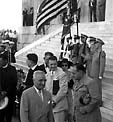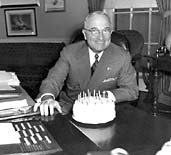|
|
|
In 1948, Truman defeated Republican Thomas E. Dewey in a stunning upset. He opened his second term with the Fair Deal plan reminiscent of Franklin Roosevelt's administration. That year, the British mandate in Palestine ended and the State of Israel was declared. The US was one of the first world powers to recognize Israel as a new nation.
|

Figurine, HSTR 22820
|
|
|
|
|
|
Although Truman grew up in an area of the Midwest that was sympathetic to southern views, his domestic policies detailed in the Fair Deal plan were visionary for the time. Truman submitted the most ambitious civil rights program to Congress ever proposed by a president. It called for the creation of the Commission on Civil Rights, Fair Employment Practices Commission, a federal anti-lynching law and integration of the armed forces. Many of the advances made later in the Civil Rights movement had their beginnings during the Truman administration. |
|
|
|
|
 |
|
The threat of Communist occupation continued into the 1950s with the invasion of South Korea by the communist North. General Douglas MacArthur led US troops to push the enemy north. They were met by thousands of sympathetic Chinese troops. MacArthur called for war with China but Truman disagreed, fearing it would lead to nuclear war. When MacArthur publicly criticized the President's decision, Truman fired him for insubordination.
At the end of his presidency, with the war continuing in Korea, Truman's approval rating was only 31%. However, as time passes, historians and the public are reconsidering his contributions. Former President Truman's ranking among US presidents continues to rise. |
|
|
|
|
 |
|
|
|
|
|
|
|
|
|

|